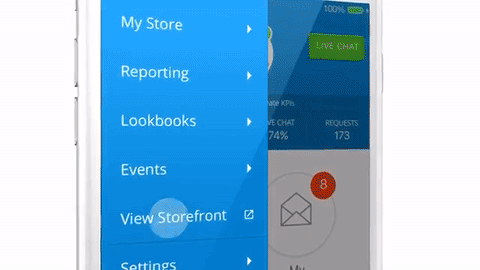[title image from Flickr]
Sephora is now the #1 specialty beauty retailer in the world, and it’s all due to how they’re different from your mom’s makeup buying experience. Sephora’s success shows that when you let customers create a shopping experience that works for them, it also works for you. Here’s how you can do the same:
1. Build the in-store experience they desire

When you walk into a back-lit, booming Sephora store, you feel more than welcomed, you feel empowered. Sephora’s approach to merchandising has contributed immensely to their success as they identified all the hurdles of purchasing makeup and promptly tossed them out the door.
Sephora knows that customers are exhausted by the grab-bag quality of pharmacy makeup aisles and the competitive product-pushing found in traditional department stores. The Sephora alternative offers a more accessible shopping experience that’s designed to be low-pressure. Retail assistants are taught to refrain from the hard sell that department stores rely on and instead work with each customer holistically to find the products that match them best while stepping back as needed. This gives Sephora customers the power to choose both their products and their service; they have the freedom to explore the store as they would a pharmacy without sacrificing department store-quality brands, tutorials, and assistance.
2. Offer a personalized approach

Customers are increasingly demanding customization as part of their shopping experience—especially if they’re shelling out for luxuries like makeup. Whether it’s primer for oily skin or moisturizer for dry, Sephora recognizes that their customers require a unique and personalized approach, and they offer this through in-store swatch samplings and makeup demonstrations that allow shoppers to test different brands to be sure they’re buying the right product at the right place.
But Sephora doesn’t stop there: their personalized shopping experience extends to the web, which has been a major key to their success in keeping customers loyal to their brand.
3. Reward loyalty

While baby boomers tend to be brand-loyal, the growing millennial market is more cost-conscious and would rather selectively pick and choose across brands so long as they fit their budget. So how do you get them to be loyal to your business? Give them the most bang for their buck: a loyalty program that rewards them and caters to their needs.
One of Sephora’s secret weapons is its VIB loyalty program, which grants members free gifts, in-store event offers, and discounts after their purchases. What makes VIB so dangerously effective is that it also requests that its members fill out their profile with information regarding their complexion, skin type, and other preferences. Sephora then analyzes this data to create a curated set of product recommendations that suit their specific needs.
The strategy is meant to digitalize the personalized, in-store shopping experience that customers have upon walking into their local brick-and-mortar.
“[We] figured out early on that if we were to get the basics right, we should ask the questions as if we were standing in the store,” Bridget Dolan, VP of Interactive Media at Sephora, shares with Forbes. “What skin type do you have? …If she tells us that she has dry skin then the product that she’s going to receive in an email will have that attribute.”
Evidently, all that tailoring works—Dolan says that a whopping 80 percent of Sephora’s transactions now run through VIB and that clearly, “It’s a win-win.” [Source]
4. Think mobile and digital first

Much of Sephora’s success is due its digital customer experience, which is interactive, multipurpose, and totally on-point. Nearly half of Sephora’s digital traffic is through its mobile interface [source], which features almost all the accoutrements of its desktop site, including a user-friendly layout that conveniently highlights all product news on the front page.
But Sephora didn’t just build their website around their customers’ desire to shop—it also accommodates their pressing need to ensure quality before they buy. This is why Sephora.com is revolutionary for providing sections for user-generated content such as BeautyTalk, a forum for casual customers and experts alike to discuss products, and the Beauty Board, a space for customers to post pictures of how their Sephora-bought cosmetics fare out in the real world.
5. Collaborate with the culture

If your customers aren’t already shopping through your website, they’re still likely to research your products online. Beauty bloggers on YouTube and Instagram are gradually replacing counter clerks in educating consumers on the best makeup brands and application lessons. Sephora embraced this culture by partnering with such key influencers, and their collaboration has indirectly increased the brand’s engagement with all other consumers online.
The reason why is simple: word-of-mouth continues to be the best way to market, and these big-name beauty bloggers are trusted by even the most discerning customers. Bloggers will speak plainly when they feel a product is expensive or reliable, and because customers crave this authenticity, they’re more likely to follow their advice than that of expert cosmeticians. Sephora now owes a great deal of its brand awareness to these bloggers who preach the quality of their products; their promotion has helped increase traffic to Sephora’s online storefront and cultivate a positive reputation on social media.
Speaking of social media…
6. Be truly social

Customers hate feeling that they’re speaking to a marketing department; they want brands with an online presence that’s personified, humorous, conversational. This is why being interactive with consumers via social media is crucial in giving them the experience that they want.
Along with actively liking, commenting, and responding to customers’ posts, Sephora frequently uses their Instagram to share looks posted by their fans. The prestige that comes along with this promotion has since encouraged thousands of users to tag #Sephora in their posts for a chance to be featured on their page. It’s Sephora’s sincere, mutually beneficial, give-and-take relationship here that keeps their customers engaged and their social media truly social.
——————-
Combining the best of both in-store and online shopping is what makes Sephora shine in the industry. The beauty brand knows that digitalizing the in-store experience is the new market tactic, but it’s no secret—and it’s applicable to all retailers.
Want to bring your customer service to the mobile world, too? It’s easier than you think! Get started now with a retail app that works for you.








